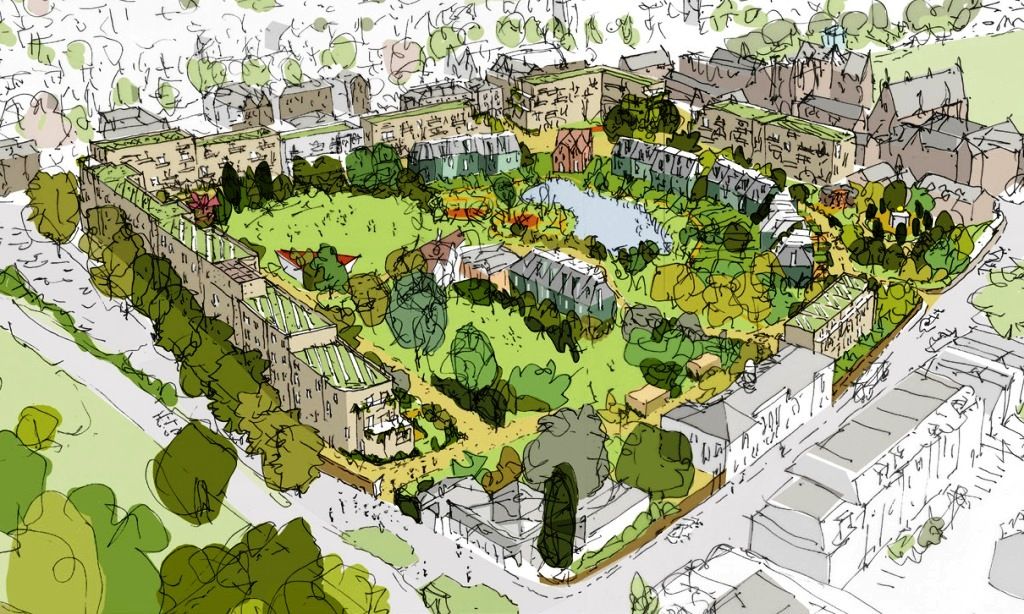The Society has made a formal submission in response to the planning application for the redevelopment of the Zoo Gardens. The Gardens are designated as public open space in the development plan and on reflection the Society is not convinced by the current plans to partially develop the site for housing whilst retaining open space as publicly accessible gardens. We think that the proposal is neither fish nor fowl. It would be better either being kept as open space or redeveloped for housing.
The Society questions who will wish to visit the site when it is surrounded and dominated by private housing. The special character of the existing Gardens will be further eroded with vehicles accessing an area where no vehicles have previously been permitted, both passing through the open space and parking there on a permanent basis. The verdant nature of the area will inevitably be completely transformed.
In addition, there will be the challenge of maintaining such a significant area of open space, presumably paid for by service charges on future residents. There will be inevitable pressure to create a gated community at some point in the future.
The Zoo Gardens currently provide an oasis of calm that has been enjoyed by Bristolians for generations. We consider that they are of such special environmental and historical importance that they should be retained as a fully accessible public asset.
However, should the scheme go ahead, our submission (see link below) identifies a number of areas for improvement in relation to the current proposals.
Simon Birch


I would like to concur with all the reservations expressed here in the detailed response by the Civic Society. I have been a volunteer at the Zoo for the past 5 years and am very concerned about this valuable asset’s future.
In particular I would like to reiterate the queries about how the gardens would be maintained and how they would, in reality, be used. How would they be protected? There is significant and locally rare wildlife in the gardens. I saw a Water Rail there – a species more often associated with wetlands like the Levels, and pretty unusual to spot even there! I fear much of this would be lost. Surely the water features should not be used for windsurfing?! Even boating would be damaging environmentally. In my view the site should be planned and maintained with the environment and ecological considerations firmly prioritised. Surely this site must be a showcase of urban environmentalism? The planned Conservation Hub strongly suggests it; anyone visiting would expect the gardens and open spaces to focus on this, rather than active leisure and water pursuits. Avon Wildlife Trust and/or the Avon Gorge and Wildlife Project should have management responsibilities and be properly funded. There is a fantastic opportunity for modelling cutting edge urban planning for the future here in Bristol and it looks as if it’s being squandered.
The housing development, from the plans I have seen, is far too dense and encircles the site in a very domineering way. I completely agree that the building heights are out of keeping and will have significant impacts on both the open space and local residents, not to mention the wildlife. Wildlife corridors are needed, and the impact of vehicles on more fragile species is likely to be significant. The architecture looks frankly rather dull and unimaginative with long unbroken blocks of buildings like a wall around the site. Again, opportunities for interesting designs seem to be missing. This is certainly going to be a relatively high-cost development so why not take the chance to build fewer, more high quality homes but emphasise the public spaces more? I’m very much in favour of affordable housing, but it’s never going to be affordable on this site, no matter what the design. Better to provide such homes on other, less fragile sites.
Late in the day, but a campaign has been started not just to comment on the nature of the proposed development but to question the Zoo’s business case for closing the Zoo and to challenge the very notion that this historic site and public amenity which great numbers of Bristolians have enjoyed over the centuries can be lost without a murmur.
Until 2020 the Zoo’s strategy had always been to maintain both the Clifton Zoo site and the Wild Place in South Gloucestershire in parallel and, while complementary, run as separate businesses with their own operational strategies. Every annual report to this date reiterated this approach and spoke of the joint success of both sites in financial, conservation, educational and popularity terms. But in 2020 the Zoo announced a dramatic change in direction with a plan to close the historic Clifton site, to sell all their properties in Bristol and direct all efforts and resources into the Wild Place. The primary reasons given were that the WildPlace would be an all-round better site for animal conservation, but also claiming that visitor numbers were declining and the Zoo group’s combined finances were on a downhill trajectory over the following 20 years.
A report just published, which you may have seen publicised on the local news and in the press, challenges this PR story. The report makes clear that these decisions were made in the early desperate months of the pandemic and that insufficient time was allowed to give their 2020-2025 Strategy a chance. In summary:
• The Zoo’s finances were not as bad as they made out
• Visitor numbers were steady and recovering
• Most of the animals are not going to the Wild Place
• The promise of affordable housing is a nonsense
• The guarantee of green space is flimsy
The closure of the Clifton site has been presented as a fait accompli and there is no evidence of any concerted attempt to bring the public behind the survival of the Zoo, or to explore other options, but only to talk of the impact of the proposed housing development on the site. Discussions and ‘consultation’ have been limited to the idea that development was the only viable option.
The site has not been sold and every effort must be made to block the planning application due for determination in Feb’23. It’s not too late for the Zoo to correct their course and the campaign has a growing number of Zoo shareholders who are unhappy about the situation.
Please visit to sign the petition and for an in-depth analysis of the situation and a guide on how to object.
We urge Bristol Civic Society and its members to take a stronger line. The Civic Society’s stated aim is ‘ that it exists to improve Bristol’s built environment and celebrate its heritage’. Surely the loss of the Zoo to an exclusive housing development is just the sort of thing we should fiercely resist?
Visitor numbers, membership and income for Bristol Zoo have been on the decline for years. Building maintenance has not been carried out; see for example how shabby the Victorian Entrance Pavilion is, unpainted and falling apart from neglect. It’s the same all round inside the site.
Customer feedback about the Zoo on social media was often negative: “expensive day out, no interesting animals, not worth the cost”. Then in 2020 Covid was the final blow that broke the Zoo’s financial model; high and increasing fixed costs, zero income – you can’t run a business that way.
We may not want to lose the Zoo from Clifton but – other than perhaps securing a new patron with very deep pockets – the management of the Zoo had no alternative to closing Clifton and concentrating on Wild Place which is 11X bigger and far more suitable as a future zoo. (Wild Place was given to the Zoo back around 1960; decades for the financial penny to drop!) Personally I think they should have moved years ago.
The Civic Society is right to question the current “private + public space” development proposal which is neither fish nor fowl and probably cloaks an intention to privatise the space in future, but there is zero mileage in trying to persuade the Zoo to stay. That ship has sailed. Zoo management must wish they had decided to move long ago.